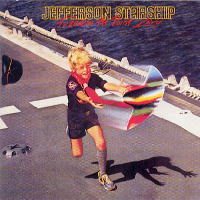| Freedom at Point Zero | ||||
|---|---|---|---|---|
 | ||||
| Studio album by | ||||
| Released | November 1979 [1] | |||
| Recorded | 1979 | |||
| Studio | The Record Plant, Los Angeles and Sausalito | |||
| Genre | Rock, hard rock, arena rock | |||
| Length | 42:27 | |||
| Label | Grunt | |||
| Producer | Ron Nevison | |||
| Jefferson Starship chronology | ||||
| ||||
Freedom at Point Zero is the fifth album by American rock band Jefferson Starship, released in 1979. It was the first album for new lead singer Mickey Thomas, and the first after both Grace Slick and Marty Balin left the previous year (Slick rejoined the band for their next album Modern Times in 1981 and Balin joined the revived Jefferson Starship in 1993). Aynsley Dunbar plays drums on this album; he had left Journey the previous year. The album cover was shot on location in the San Francisco Bay on board the USCGC Midgett.[ citation needed ]
Contents
- Critical reception
- Track listing
- Personnel
- Jefferson Starship
- Additional personnel
- Production
- Charts
- Certifications
- References
The album spawned the hit single "Jane", which peaked on the Billboard Hot 100 at No. 14 and spent three weeks at No. 6 on the Cash Box Top 100. [2] "Jane" was featured in the 2009 video game Grand Theft Auto IV: The Lost and Damned , as well as the opening music to the film Wet Hot American Summer and its prequel series Wet Hot American Summer: First Day of Camp , while also being featured in the 2023 comedy thriller film Cocaine Bear . It is one of the few songs that was performed live by both the Paul Kantner-led Jefferson Starship TNG and the Mickey Thomas-led Starship. The song "Lightning Rose" predicts the concept of the Nuclear Furniture album, and in fact its character Lightning Rose would return on Nuclear Furniture as the key character in that album's concept.